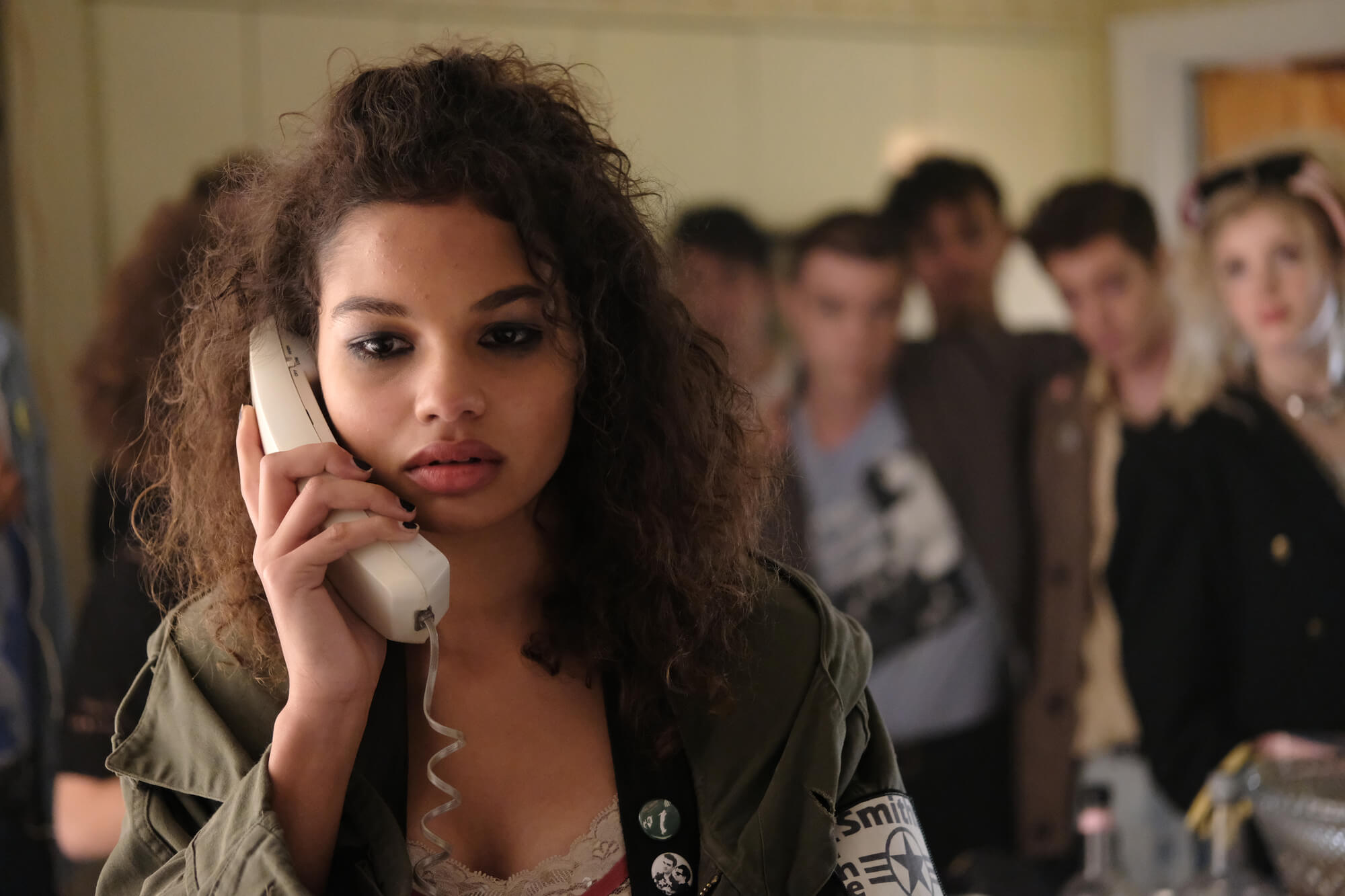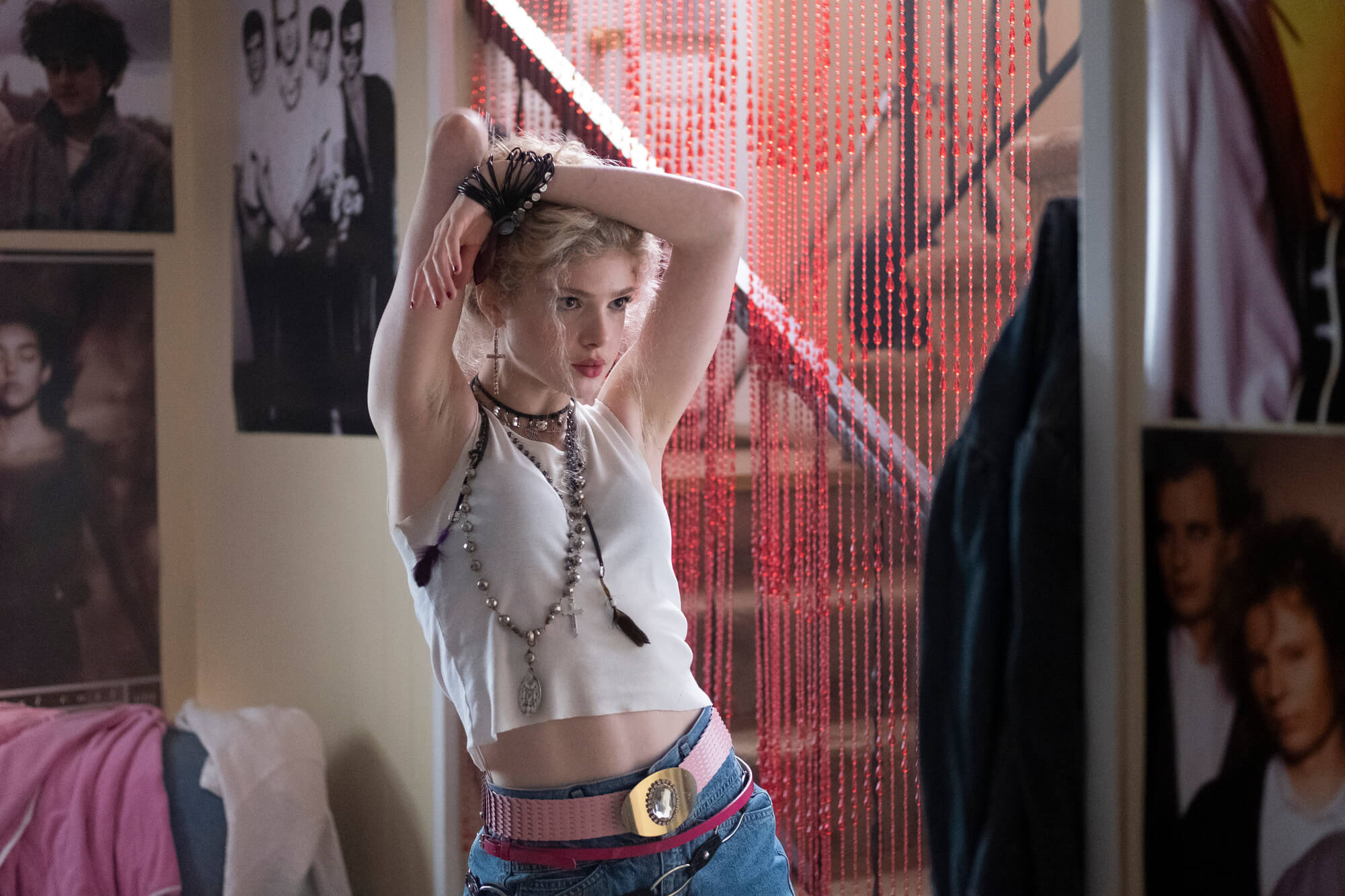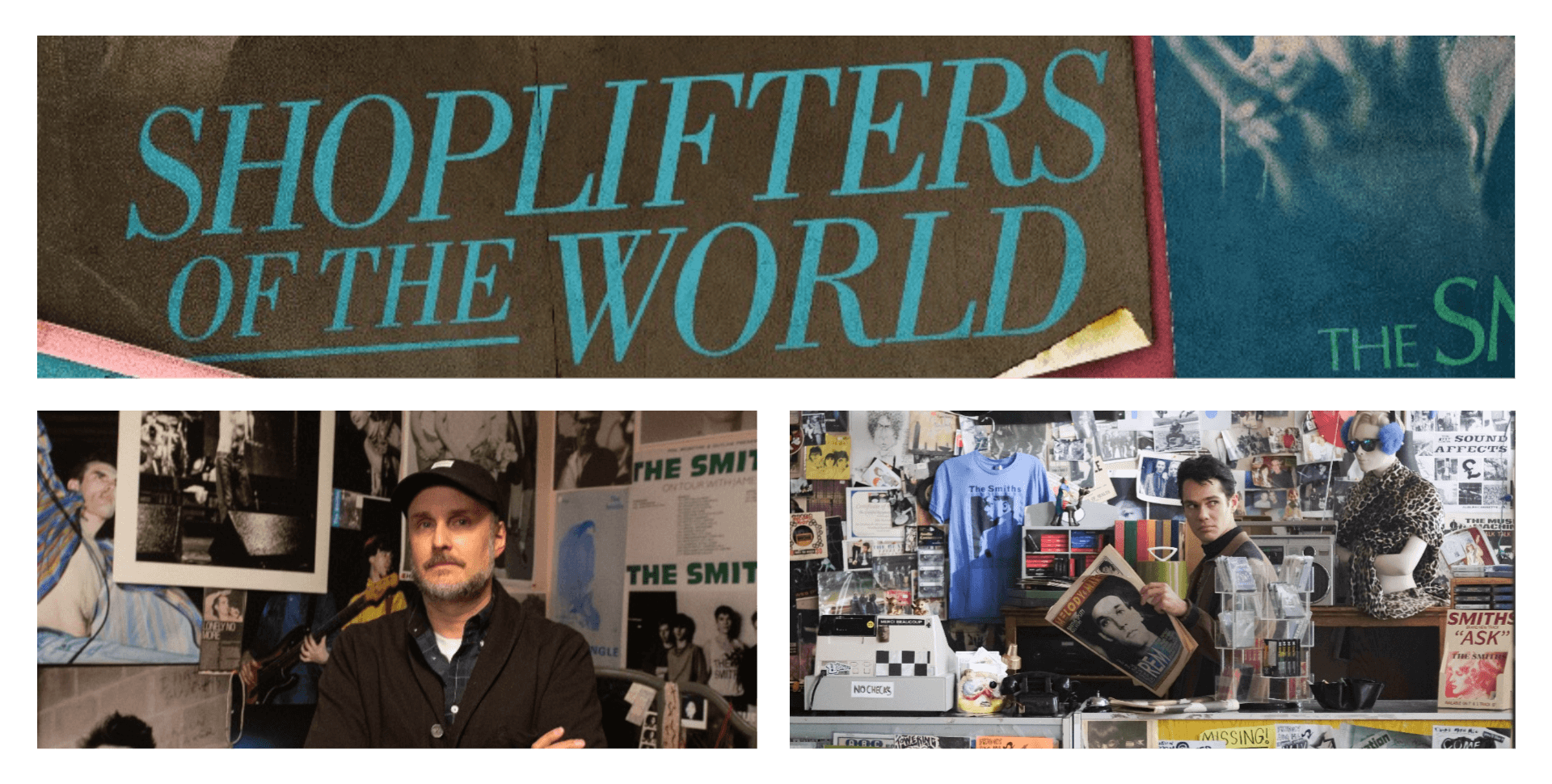Shoplifters of the World is the 2021 comedy-drama that follows a group of friends in 1987 as the iconic British band The Smiths disband and fans in a small Colorado town process the loss.
Writer/director of Shoplifters of the World, Stephen Kijak spoke with Borrowing Tape writer Nace DeSanders on the various elements of the filmmaking process — which is now available to watch via VOD and digital platforms and will be available June 1st on Blu-ray and DVD.
Listen to our podcast episode and/or read the transcript, which has been edited and condensed for clarity:
Hi everyone. My name is Nace DeSanders of Borrowing Tape and I am here with Stephen Kijak, the writer, and director of Shoplifters of the World, a comedy-drama about a group of small-town teens who gripe with the loss of disbanding of their favorite band: The Smiths. Thank you for being here, Stephen.
My pleasure.
So, Shoplifters of the World opens with the words “Based on True Intentions”. Can you elaborate on that?
Yes. It is based on an urban myth about a Smith's fan who in the eighties in Denver, Colorado was so heartbroken that his favorite band broke up, that he planned to take over a radio station in his hometown, and a commercial radio station that just played Top 40 hits. And he wanted to force them to play The Smiths all night. And in fact, he didn't go through with it. He ended up losing his nerve, calling a security guard over and asking him to call the police, instead of just going home and pretending like nothing happened. We learned, as you researched the story that he was in a kind of a desperate state, really needed some help. So, you know, he asked the police to be called, he was taken away. And I think the last thing he was heard to be saying, as they put him in the car was, "I just wanted them to play my music." So, it's a sweet little story. And it blossomed into this myth of this takeover at the radio station to a point where it's become part of Smith's lore. And a friend of mine, Lorianne Hall, who has the story by credit on the film, grew up in Denver. And one night, we were just kicking around ideas and having cocktails. And she said, dude, you remember that thing that happened in Colorado when The Smiths broke up and I was like a huge Smiths fan. And I had never heard this story before. So, it really sparked my imagination and it just sounded like the perfect frame for a story like let's let him have his glory, right. Let him actually take over the station and just see what happens.
Yeah, that's really cool. And I'm glad the real person was able to get help at the end as well.
Yeah, I mean, it apparently turned him around — there's some stuff written about him online. I wish we'd been able to find him, we kind of researched it as we were going. And really the only thing you can find were things we got from the library in Denver by just calling them up. So yeah, pretty interesting.

You're known for films about music and bands. Why is this a topic that you gravitate towards?
I just think I always wanted to be in a band. I mean, I was that kid who worked at the record store in high school. I collected vinyl. I played in bands growing up. It just always was around me. It's what I love. I always say the films are kind of like my version of making mixed tapes for my friends. I'm a little older than you. I grew up in the eighties where the mixed tape was like the total art form, just trying to turn your friends on to new sounds and introduce people to new music. It's kind of like that. I mean, I just love music and musicians. I love the creative process of learning about new music and I love telling these stories and it's a way to just turn people on and to tell a story with music.
So, what was your original introduction to The Smiths?
I grew up in Massachusetts, a little town on Cape Cod and we had a great college radio station. It's actually still there. WKKL Cape Cod community college radio — it's great. And Boston had a great music scene. So we just had really great music growing up, that wasn't in the mainstream. And they just dropped "How Soon Is Now?" one day. I mean, I must've been 13 or 14 years old, maybe a little older. But I can picture my bedroom and the speakers and the little cruddy old stereo I had. And I just remember hearing that tune, and not even really knowing what it was, I think you had to call the station and couldn't get through or whatever.
And then some weeks later my friends and I were just at the mall, going into the record store and I always went to the back where they had the import section, just was like flipping through. And I saw this 12-inch single that said The Smiths — had never heard of them. But it looked cool. I would buy things a lot just based on the album covers. Took it home and put it on. It was like, "Oh God, that song I heard it's that song, it's the greatest song I've ever heard." So it just kind of started like that. It was almost like an accident, you know? And they just spoke to me. They spoke to us at that time, they just became our favorite band. They really changed a lot for a lot of people.
I thought one of the more interesting creative choices throughout the film was that you had inner cut the narrative with a documentary about The Smiths. Why did you choose to do this?
A few reasons. I mean, there just came a point when I showed it to some friends when we were cutting it and I purposely made sure none of them really knew the band and they were just a little bit confused about who the band were and why they were so important. And I make music documentaries. So when someone just said, why don't you just cut a little documentary in there? And that will really help us out a lot. And my first thought was like, ah, more music licensing and archive costs, but we found some great relatively affordable clips and it ended up working really beautifully. I like having just a little touch of the reality of who they were and what they stood for threaded throughout. I think it helps frame it and I'm a music documentary and it's nice to insert a little bit of documentary into fiction. And we're trying to do the flip side of that with some of the documentaries. So, I thought it was a good way to open the door for people.
Oh, definitely. I knew that The Smiths were a big deal, but I didn't really know if their music or a lot of the backstory. So having the documentary there for me was definitely really helpful and it brought them a little more into perspective. I'm like, Oh yeah, they were pretty great. Could you tell us a bit about the title, Shoplifters of the World?
Yeah. "Shoplifters Of The World Unite" is one of The Smith's greatest songs — came out on a 12 inch single with Candy Darling on the cover. It's just a great tune. It's very typical of their songwriting. It's got a great big glam rock hook, but the lyrics are multi-layered, they're funny, they're literate. It's not about actual shoplifting. In fact, it's more about cultural shoplifting — about appropriation and quoting and stealing from literary and artistic sources, which is a lot of how that band put their music together. It's just deeply layered with quotes, from books and plays and movies. It's a really densely referential kind of songwriting and we extended that aesthetic into the script itself. Everything is stitched together from lyrics and quotes from plays and old British films and things like that. So yeah, they just go through the night, stealing little things from the world, from each other. And it's just a rallying cry. It's like, it's an anthem for the outsider.

How did the Cinematographer Andrew Wheeler come to be a part of the project?
Andrew Wheeler, what a dude. He actually went to high school with Nick and Joe Manganiello. So, they're old friends. He was an old Mohawk punk back in high school, leather jacket played in a hardcore band. You'd never know it meeting him today. But he was a friend of theirs. We had somebody lined up who ended up, I think on a TV show or traveling abroad and just all of a sudden after years of developing it, the window opens and we have to shoot and he wasn't available. So, Nick and Joe were like, "Got to call Wheels. He's your man." And luckily, he's fantastic — he had done some features in commercial work, really sensitive, a really good eye, and he pushed for like the wider aspect ratio. And we had done a lot of work already to build up the visual references of a world. And he really took to it, had a great crew, and really delivered — I love what he did.
Which films or directors have influenced you as a filmmaker, but also the film, Shoplifters of the World?
Everyone will always, I think it's just a straight-up John Hughes, like Pretty in Pink homage and that is there. But I remember enjoying those films when I was a youth. They didn't necessarily push me into filmmaking so much. I think when I got interested in filmmaking, I was finding filmmakers like Adam [inaudible], Peter Greenaway, John Waters. I love David Lynch, Patricia Rozema, and Almodóvar’s another favorite — that second wave of a great kind of international auteur cinema. Like the art house stuff, was what really turned me on. And for this, we really actually looked at more than anything American Graffiti and Diner which are two total classics. It's just like Teenagers and Cars at Night in America and they're steeped in more like fifties aesthetic, which is the cinematic vibe that influenced a lot of The Smith's stuff. We're going to create the eighties that were actually influenced by something a lot older, as opposed to an eighties movie inspired by the eighties. So, it's a bit of a twist.
That's really interesting, kind of comes full circle. So, what are you currently working on? Are there any new projects that we should be looking out for?
Yeah well, I wrote a kind of a follow-up to Shoplifters. It's sort of set in 89, it's a different band. I'm looking at maybe doing an eighties trilogy. Can't really say who the band is yet, but it's the flip side of The Smith's moody angst. It's going to be a lot more fun and a lot more queer and a lot more colorful and just really out there. Can't wait to talk more about it soon, but in the meantime, I'm actually going back to a documentary. Back in the eighties, telling the story of the actor Rock Hudson, who was one of the first really famous people to die of AIDS. So we're going to be looking at the AIDS crisis of the eighties and how his admission and his public declaration of being HIV positive, and having AIDS changed the cultural conversation and public policy around it. So, dealing with things like ACT UP and all that stuff, including a look back at his career. So, that should be cool.
Related: Review of Shoplifters of the World

